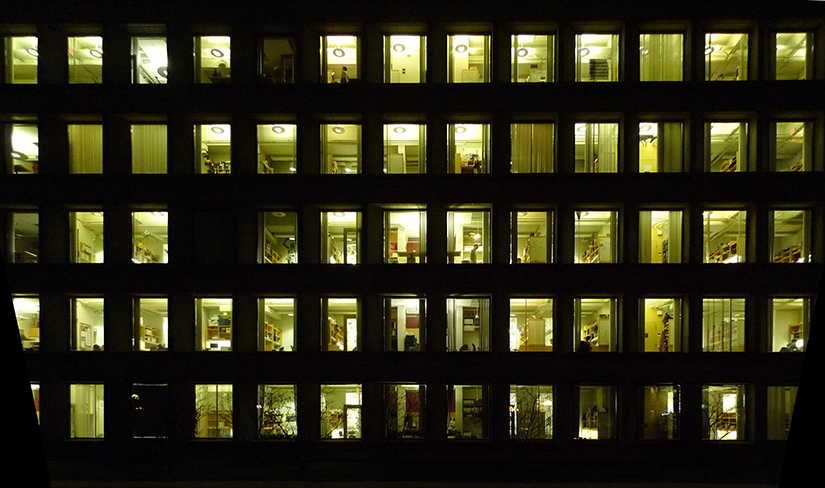
|

Introduction to work and the economy Read Online
18.1 Economic systems Read Online

What if the U.S. economy thrived solely on basic bartering instead of its bustling agricultural and technological goods? Would you still see a busy building like the one shown in [link] ?
In sociology, economy refers to the social institution through which a society’s resources are exchanged and managed. The earliest economies were based on trade, which is often a simple exchange in which people traded one item for another. While today’s economic activities are more complex than those early trades, the underlying goals remain the same: exchanging goods and services allows individuals to meet their needs and wants. In 1893, Émile Durkheim described what he called “mechanical” and “organic” solidarity that correlates to a society’s economy. Mechanical solidarity exists in simpler societies where social cohesion comes from sharing similar work, education, and religion. Organic solidarity arises out of the mutual interdependence created by the specialization of work. The complex U.S. economy, and the economies of other industrialized nations, meet the definition of organic solidarity. Most individuals perform a specialized task to earn money they use to trade for goods and services provided by others who perform different specialized tasks. In a simplified example, an elementary school teacher relies on farmers for food, doctors for healthcare, carpenters to build shelter, and so on. The farmers, doctors, and carpenters all rely on the teacher to educate their children. They are all dependent on each other and their work.
Economy is one of human society’s earliest social structures. Our earliest forms of writing (such as Sumerian clay tablets) were developed to record transactions, payments, and debts between merchants. As societies grow and change, so do their economies. The economy of a small farming community is very different from the economy of a large nation with advanced technology. In this chapter, we will examine different types of economic systems and how they have functioned in various societies.
Detroit, once the roaring headquarters of the country’s large and profitable automotive industry, had already been in a population decline for several decades as auto manufacturing jobs were being outsourced to other countries and foreign car brands began to take increasing portions of U.S. market share. According to State of Michigan population data (State of Michigan, n.d.), Detroit was home to approximately 1.85 million residents in 1950, which dwindled to slightly more than 700,000 in 2010 following the economic crash. The drastic reduction took its toll on the city. It is estimated that a third of the buildings in Detroit have been abandoned. The current average home price hovers around $7,000, while homes nationwide sell on average for around $200,000. The city has filed for bankruptcy, and its unemployment rate hovers around 30 percent.
| Start Quiz | Download PDF | |
| Start Quiz | Download PDF | |
| Start Quiz | Download PDF | |
| Start Quiz | Download PDF | |
| Start Quiz | Download PDF |
Question: Core nations are also known as __________________
Choices:
high-income nations
newly industrialized nations
low-income nations
developing nations
Question: Which of the following statements is not true?
Choices:
The life expectancy of black males in the United States is approximately five years shorter than for white males.
The infant mortality rate for blacks in the United States is almost double than it is for white.
Blacks have lower cancer rates than whites.
Hispanics have worse access to care than non-Hispanic whites.
Question: The process by which aspects of life that were considered bad or deviant are redefined as sickness and needing medical attention to remedy is called:
Choices:
deviance
medicalization
demedicalization
intersection theory
Question: Who determines which illnesses are stigmatized?
Choices:
Therapists
The patients themselves
Society
All of the above
Question: Sidewalk ramps and Braille signs are examples of _______________.
Choices:
disabilities
accommodations required by the Americans with Disabilities Act
forms of accessibility for people with disabilities
both b and c
Question: According to the World Health Organization, what was the most frequent cause of death for children under five in low income countries?
Choices:
Starvation
Thirst
Pneumonia and diarrheal diseases
All of the above
Question: The Rating of Perceived Exertion (RPE) is an example of ________________
Choices:
the social construction of health
medicalization
disability accommodations
a contested illness
Question: What are the most commonly diagnosed mental disorders in the United States?
Choices:
ADHD
Mood disorders
Autism spectrum disorders
Anxiety disorders
Question: Chronic fatigue syndrome is an example of _______________.
Choices:
a stigmatized disease
a contested illness
a disability
demedicalization
Question: Many deaths in high-income nations are linked to __________________
Choices:
lung cancer
obesity
mental illness
lack of clean water
Question: What is social epidemiology?
Choices:
The study of why some diseases are stigmatized and others are not
The study of why diseases spread
The study of the mental health of a society
The study of the causes and distribution of diseases